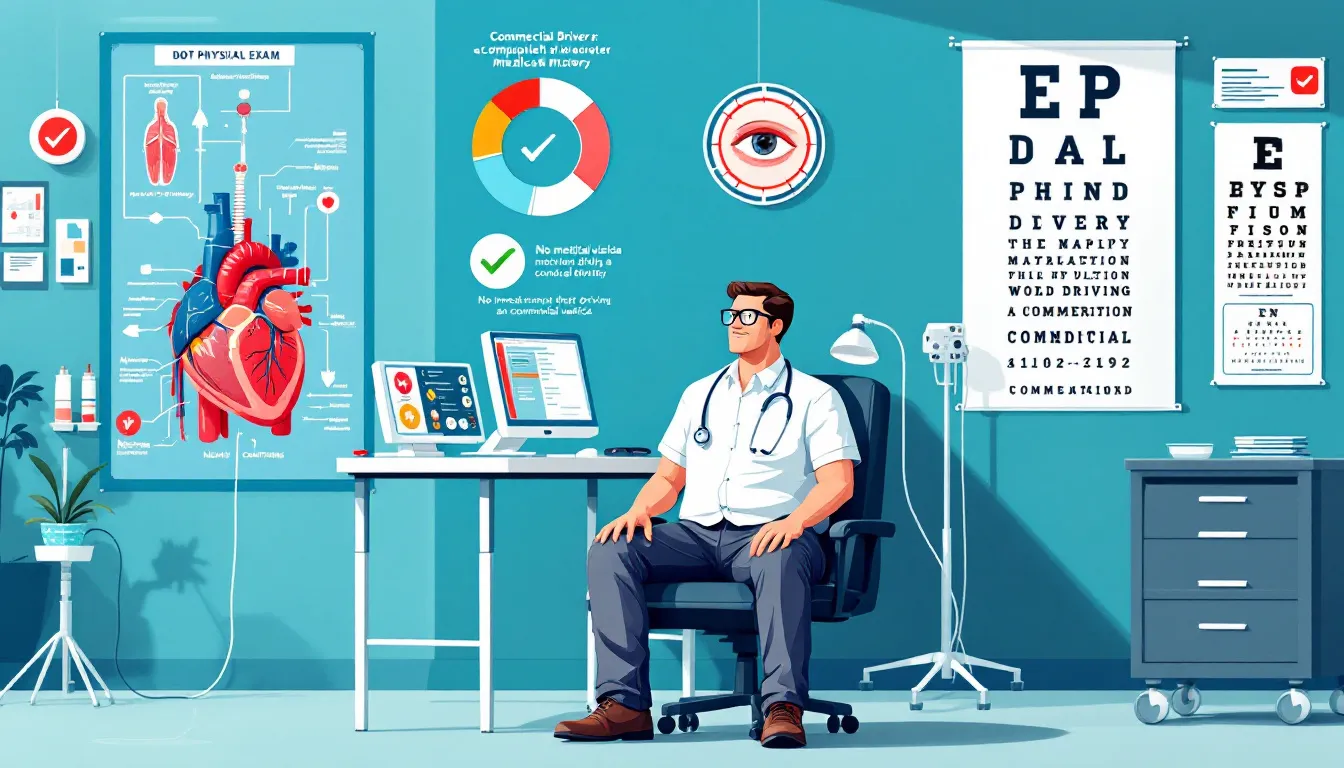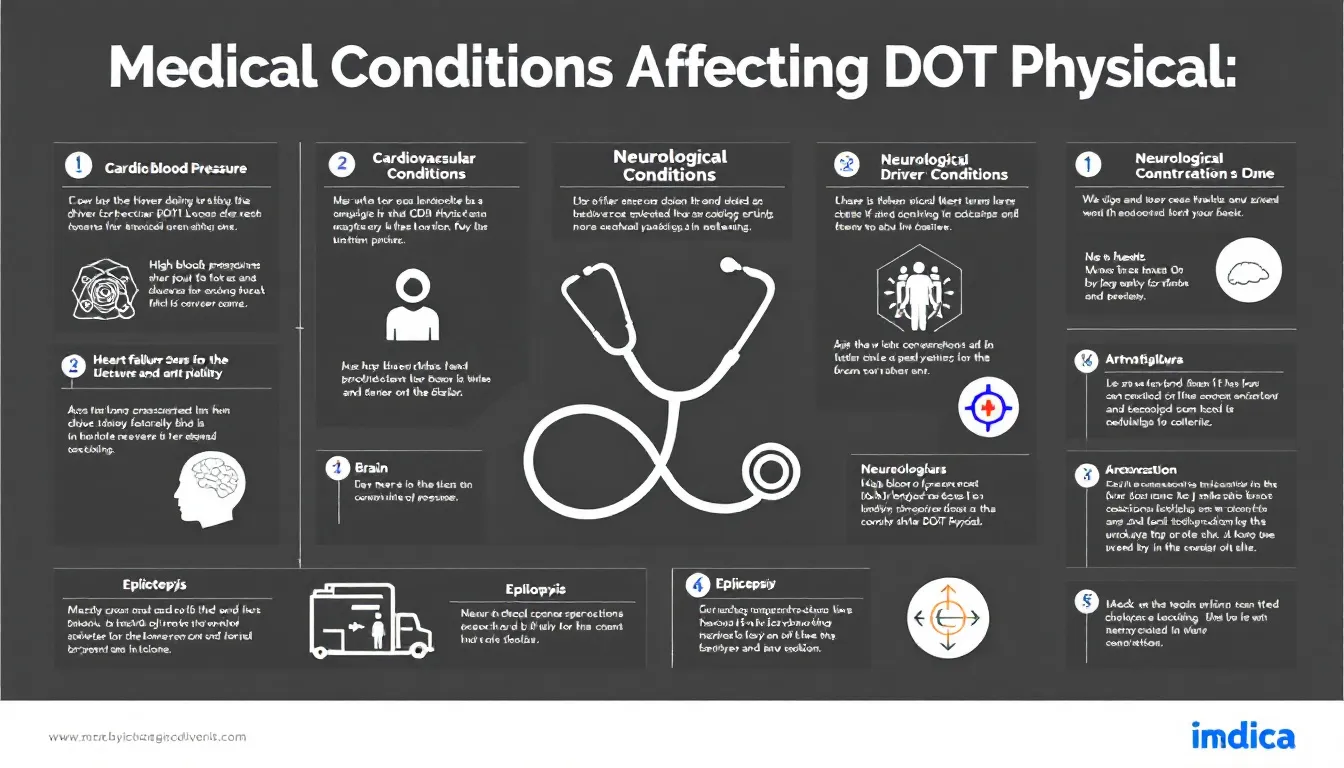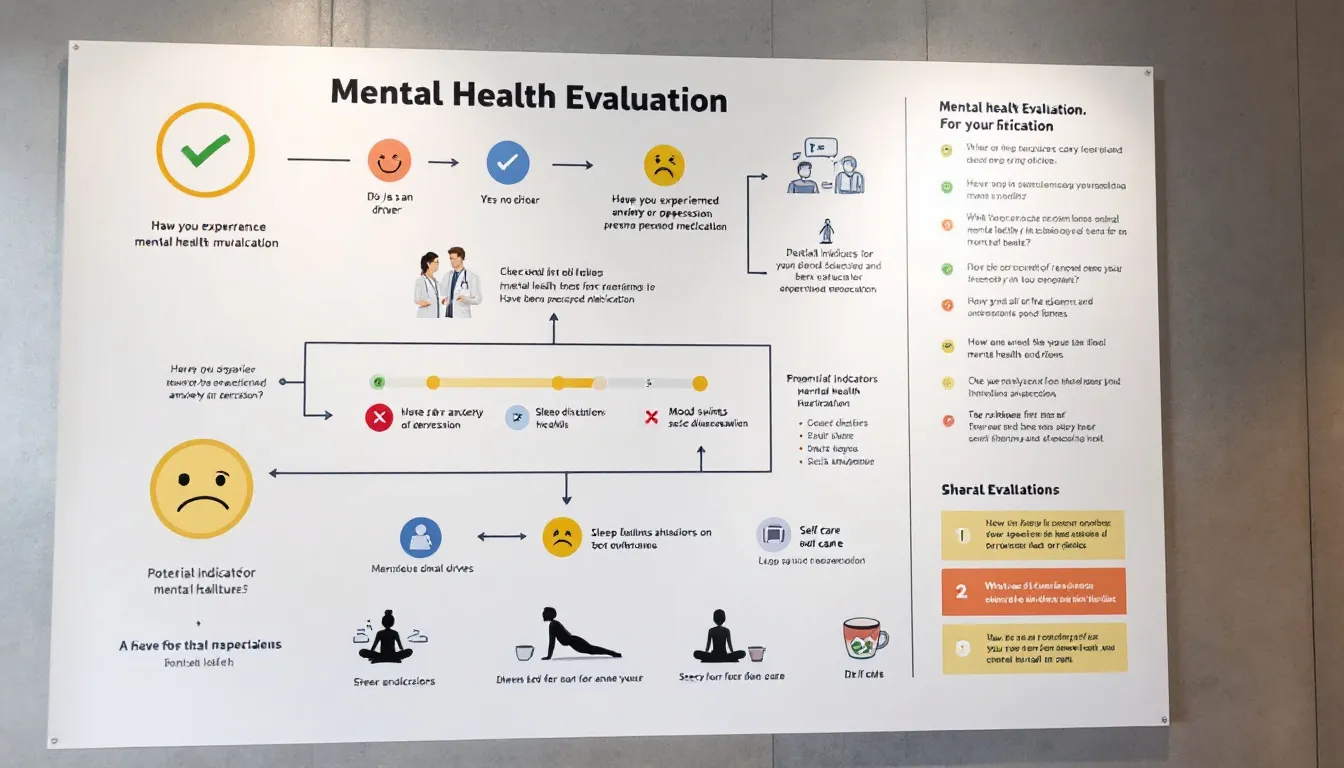Worried about passing your DOT physical because of a medical condition? This guide covers everything you need to know about common DOT medical conditions and how they affect your eligibility.
Key Takeaways
- DOT physical exams are mandatory for commercial drivers to ensure they are medically fit, focusing on public safety and reducing accident risks.
- Common medical conditions, such as vision impairments, heart issues, respiratory conditions, and mental health disorders can affect a driver’s ability to pass the DOT physical, necessitating careful management and documentation.
- Drivers can appeal a failed DOT physical by applying for medical exemptions or seeking second opinions from other certified examiners to demonstrate their fitness to drive.
Importance of DOT Physical Exams for Commercial Drivers

DOT physical exams are mandated by the Federal Motor Carrier Safety Administration (FMCSA) to ensure that commercial drivers are medically fit to operate a commercial motor vehicle, prioritizing public safety. These exams are crucial as they help identify any medical conditions that could impair a driver’s ability to safely operate a commercial vehicle. Unlike regular drivers, commercial drivers must meet stringent health criteria that focus on physical, mental, and emotional fitness. This rigorous evaluation helps in reducing the risk of accidents caused by medical issues, thereby protecting not just the drivers but everyone sharing the road.
Certified medical examiners are crucial in this process. They undergo specific training and must pass an examination to receive FMCSA certification. Their expertise guarantees that the physical examination meets federal standards. Examiners must submit physical exam results by the end of the day, ensuring timely updates to the driver’s medical certification status.
Drivers must complete a personal health history during a DOT physical, providing the examiner with crucial information about any pre-existing conditions. This thorough examination includes various tests to determine if the driver meets FMCSA health standards.
The aim is to ensure each driver passes the DOT physicals and can continue safely operating commercial vehicles, upholding high safety standards.
Common Medical Conditions Affecting DOT Physicals

Several medical conditions can impact your ability to pass the DOT physical exam. These conditions range from vision and hearing impairments to heart and respiratory issues, diabetes, and mental health disorders. These conditions can significantly risk safe driving if improperly managed. Being aware of these medical conditions and their impact on your eligibility helps you prepare better for your DOT physical.
The medical examiner assesses whether a condition is serious enough to prevent driving or requires treatment. If a medical condition is found, the driver may be disqualified or require more frequent monitoring. Drivers with temporary certifications due to a dot disqualifying medical condition may need reassessment every 12 months.
Let’s delve deeper into specific conditions that could affect your DOT physical.
Hearing and Vision Requirements
Safe driving critically depends on hearing and vision. For vision, drivers must meet specific standards, such as recognizing traffic light colors and having a minimum visual acuity of 20/40 in each eye. Drivers meeting the vision standard in only one eye need an Alternative Vision Standard certification and must pass a driving test. Corrective lenses such as glasses or contacts are acceptable; drivers must bring them to the exam if needed.
Hearing standards are equally rigorous. Drivers must hear a forced whisper at five feet without a hearing aid. Alternatively, drivers must have hearing loss less than 40 decibels in the good ear to pass.
If hearing aids are needed, bring them to the exam to meet standards. These evaluations ensure drivers can effectively perceive and respond to their environment, maintaining high road safety standards.
Heart Conditions and Cardiovascular Diseases
DOT physical exams heavily scrutinize heart conditions. Drivers with heart issues like myocardial infarction or arrhythmias need cardiologist clearance. Stable angina isn’t necessarily disqualifying if well-managed. The examiner checks for irregular heartbeats during cardiovascular evaluations. Hypertension is also assessed.
Controlling high blood pressure is vital. A healthy blood pressure for DOT physicals is 120/80 or below. Drivers with hypertension must get annual certification and control their blood pressure through diet, exercise, and medication. A reading of 140/90 or below is required to pass after Stage 2 hypertension. Skipping caffeine and tobacco the day before can help manage blood pressure.
The examiner also measures pulse rate and checks for cardiovascular disease symptoms. If a driver’s heart condition is well-managed and meets criteria, they can pass the DOT physical and safely operate a commercial vehicle.
Respiratory Conditions
Respiratory conditions like asthma, bronchitis, emphysema, and sleep apnea can impact DOT physicals. Drivers with sleep apnea must show treatment compliance to pass. Reported symptoms may indicate a need for a sleep apnea test.
Treatment compliance is crucial to ensure these conditions don’t impair safe driving.
Diabetes Management
Effective management is crucial for insulin-treated diabetic drivers to pass the DOT physical. Required documentation includes three months of glucose logs and the Insulin-Treated Diabetes Mellitus Assessment Form MCSA-5870. An evaluation from the treating clinician must be obtained before the exam. The ITDM Assessment Form is valid for 45 days, necessitating timely completion.
Insulin use is accepted with annual medical certification. If documentation is incomplete, drivers may receive three-month certification to gather necessary data. Proper management and documentation prevent diabetes from disqualifying a driver from obtaining a CDL.
Mental Health Considerations in DOT Physicals

Mental health is another crucial area evaluated. Disorders like depression, ADHD, and schizophrenia may lead to disqualification. The condition’s severity and nature are assessed case-by-case before disqualification. Mental health issues can heighten accident risks due to impulsivity and aggression.
Drivers must meet DOT mental health criteria and adhere to medication rules to pass. Drivers must manage their mental health conditions effectively and ensure medications don’t impair safe driving.
The medical examiner significantly determines mental health’s impact on a driver’s fitness.
Medications That Can Disqualify You
Certain medications can disqualify you from a DOT physical, regardless of legality or prescription status. This includes amphetamines, narcotics, and marijuana. Illegal drugs like cocaine and PCP are strictly prohibited due to severe impairment of driving abilities. Even over-the-counter medications like sleep aids and cough suppressants may contain disqualifying substances.
All medication use, including prescriptions and over-the-counter drugs, must be reported. Drivers testing positive for disqualifying medications are barred from driving until cleared.
The medical examiner makes the final decision on driving while on prescribed disqualifying medications. Proper disclosure and management of medications ensure compliance with DOT regulations.
What to Do If You Fail Your DOT Physical

Failing a DOT physical is a setback, but steps can be taken to address it. You can apply for a medical exemption if you fail due to a disqualifying condition. A complete application is required to apply for an exemption. This includes medical exams, expert opinions, employment history, driving experience, and motor vehicle records. This process allows drivers with certain conditions to continue operating if they can demonstrate safe driving.
Consider a second opinion from another certified examiner if results are unexpected. Another examiner may provide a different assessment.
If you believe in your ability to drive safely despite a condition, consider applying for an FMCSA Driver Exemption Program. These programs provide a pathway for a commercial driver to maintain your CDL and continue your career.
How to Prepare for Your DOT Physical
Being well-prepared is key to a successful DOT physical exam. Complete forms about your medical history and bring a list of medications, including prescribing doctors’ names and addresses. The exam includes a urine test and typically lasts 30 to 45 minutes. Having all necessary information and documentation ready streamlines the process.
CDL drivers must take DOT physicals every 24 months to stay compliant. Preparation ensures successful certification and avoids delays. Being proactive and organized increases your chances of passing and continuing to drive safely.
Where to Get a DOT Physical
Finding a certified medical examiner and a licensed medical practitioner is crucial for compliance with federal regulations. The National Registry helps drivers locate certified medical examiner’s examiners by city, state, or zip code. Eligible examiners include MDs, DOs, DCs, APNs, and PAs.
The Charlotte Department of Transportation Exam Center is a premier provider of DOT medical exams in Charlotte, NC, and surrounding areas. They consistently have physicians on staff to ensure the best experience.
Utilizing such resources ensures drivers find qualified professionals for DOT physicals, maintaining compliance and certification.
Summary
DOT physical exams are essential for ensuring the safety and fitness of commercial drivers. By understanding the importance of these exams, common disqualifying medical conditions, and how to prepare, drivers can navigate the process more effectively. Proper management of health conditions and medications, along with finding the right medical examiners, can help drivers maintain their certification and continue their careers. Stay informed, stay prepared, and drive safely.
For the best DOT physical examination call 704-544-3494 for the first available appointment. walk-ins are accepted on a first come first serve basis.
Frequently Asked Questions
What are the vision requirements for the DOT physical exam?
To pass the DOT physical exam, drivers must meet a minimum visual acuity requirement of 20/40 in each eye, either with or without corrective lenses. This ensures the safety of drivers on the road.
Can I pass the DOT physical if I have diabetes?
You can pass the DOT physical with diabetes if you manage your condition effectively and provide the necessary documentation regarding your treatment. It’s essential to demonstrate stable control over your diabetes to meet the requirements.
What should I do if I fail my DOT physical?
If you fail your DOT physical, consider applying for an FMCSA exemption or obtaining a second opinion from another certified examiner. Taking these steps may help you address any disqualifications effectively.
Are mental health conditions evaluated during the DOT physical?
Yes, mental health conditions are evaluated during the DOT physical, and drivers must meet specific mental health criteria to pass.
Where can I find a certified medical examiner for my DOT physical?
You can find a certified medical examiner for your DOT physical by using the National Registry, where you can enter your city, state, or zip code to locate one nearby.

I am the administrator for the Charlotte DOT Exam facility, located in Charlotte NC. I oversee the facility services providing DOT exams in accordance with the standards of the FMCSA. We also provide DOT drug testing with MRO support when required. Drug testing can also be done for non-DOT exams such as pre-employment. In order to minimize wait times, I always encourage our clients to contact us first and make an appointment.
I would also suggest that each individual wanting to test for the CDL health card read the article “Preparing For Your DOT Exam” as it lists several things to bring to the test, such as CPAP usage reports and medicine lists.
